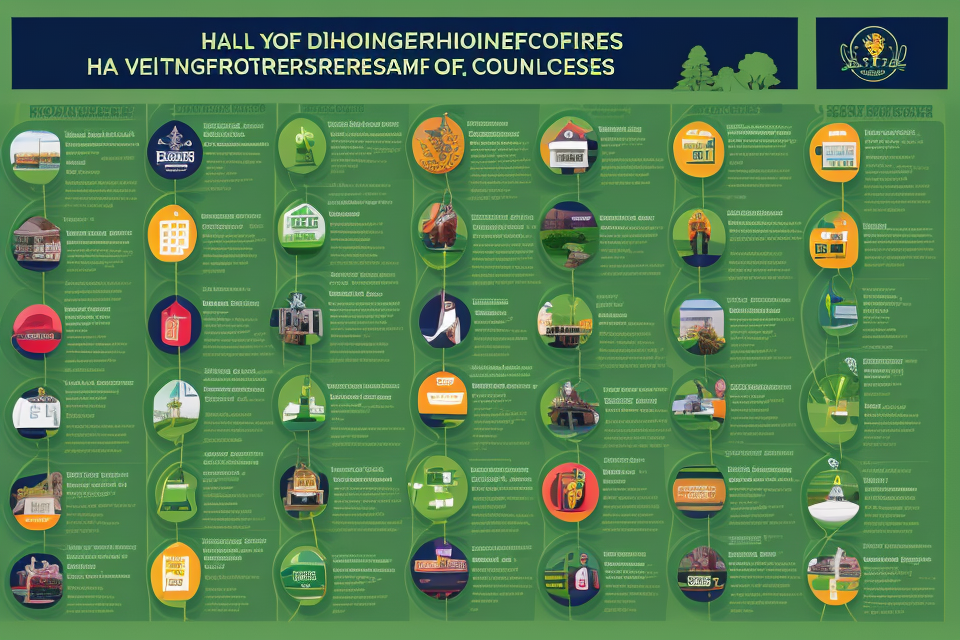Are you passionate about golf and interested in pursuing a career in the golf industry? Then you may be wondering, what degrees can you get in golf? Golf course management is a dynamic and growing field that offers a diverse range of degree programs to suit your interests and career goals. From golf turf management to golf business and marketing, there are many exciting opportunities to explore. In this article, we will take a closer look at the different types of degrees available in golf course management and what they can do for your career. So, let’s get started and discover the many possibilities that a degree in golf can offer!
Golf Course Management: An Overview
Golf Course Management: A Promising Career Path
Golf Course Management: A Promising Career Path
Golf course management is a rewarding and challenging career path that offers numerous opportunities for growth and advancement. It requires a unique blend of business acumen, environmental stewardship, and knowledge of turfgrass science. In this section, we will explore the various reasons why pursuing a career in golf course management can be a promising choice.
A Lucrative Industry
The golf industry is a significant contributor to the economy, generating billions of dollars in revenue each year. With over 15,000 golf courses worldwide, the demand for skilled golf course managers is on the rise. Golf courses are often operated as private clubs or public facilities, providing employment opportunities for managers in both sectors. Additionally, the industry is continually evolving, with new technologies and sustainable practices emerging, ensuring that golf course managers remain relevant and in-demand.
A Variety of Roles
Golf course management encompasses a wide range of roles and responsibilities, catering to various interests and skill sets. Some of the key positions within golf course management include:
- General Manager: Oversees the overall operation of the golf course, including financial management, staff supervision, and member relations.
- Superintendent: Responsible for the maintenance and upkeep of the golf course, including turfgrass management, pest control, and irrigation systems.
- Golf Professional: Provides instruction and guidance to golfers, manages golf shop operations, and plans and coordinates golf events.
- Food and Beverage Manager: Oversees the restaurant, bar, and catering operations at the golf course, ensuring a high level of customer service and satisfaction.
Opportunities for Advancement
Golf course management offers numerous opportunities for career advancement, as managers can progress through various levels of responsibility within the industry. Many golf course managers begin their careers in entry-level positions, such as assistant superintendent or assistant golf professional, before working their way up to more senior roles, such as general manager or club manager. Additionally, managers can specialize in specific areas of golf course management, such as agronomy or event planning, further enhancing their career prospects.
Continuing Education and Professional Development
Professional development is essential for golf course managers to stay current with industry trends and best practices. Many universities and golf organizations offer continuing education programs and workshops for managers to enhance their skills and knowledge. Additionally, attending industry conferences and networking with other professionals can provide valuable insights and opportunities for career growth.
In conclusion, pursuing a career in golf course management can be a promising choice for individuals interested in a challenging and rewarding industry. With a diverse range of roles and opportunities for advancement, golf course management offers a wealth of possibilities for those looking to make a meaningful contribution to the sport and the environment.
The Importance of Golf Course Management Degrees
- Specialized Knowledge and Skills: Golf course management degrees provide students with specialized knowledge and skills related to the management of golf courses. This includes understanding the unique challenges and requirements of golf course design, construction, maintenance, and operation.
- Career Advancement: Obtaining a golf course management degree can lead to career advancement opportunities within the golf industry. Golf course managers are responsible for overseeing the day-to-day operations of a golf course, including managing staff, budgeting, marketing, and customer service.
- Business Acumen: Golf course management degrees also provide students with a strong foundation in business acumen. This includes understanding financial management, marketing, and strategic planning, which are all critical skills for managing a successful golf course.
- Networking Opportunities: Pursuing a golf course management degree provides students with networking opportunities with industry professionals and peers. This can lead to valuable connections and potential job opportunities in the future.
- Industry Recognition: Golf course management degrees are recognized and respected within the golf industry. Employers may view a degree in golf course management as a valuable asset, particularly for leadership positions within golf courses and related organizations.
- Personal Growth and Development: Finally, pursuing a golf course management degree can lead to personal growth and development. Students will learn about the history and culture of golf, as well as the importance of sustainability and environmental stewardship in the industry. This can lead to a deeper appreciation and understanding of the sport and its role in society.
The Evolution of Golf Course Management Education
The field of golf course management has evolved significantly over the years, and this evolution is reflected in the educational opportunities available to those interested in pursuing a career in this field. The evolution of golf course management education can be traced back to the early 20th century, when the sport of golf began to gain popularity in the United States.
One of the earliest institutions to offer a degree in golf course management was the Oregon State College, which began offering a two-year program in golf course architecture and management in the 1920s. This program focused on teaching students the technical aspects of golf course design and construction, as well as the business and management skills necessary to run a successful golf course.
Over the years, other colleges and universities began to offer similar programs, and the field of golf course management education continued to grow and evolve. In the 1960s and 1970s, a number of universities began offering four-year degree programs in golf course management, which included a more comprehensive curriculum that covered topics such as turfgrass science, golf course design, and business management.
In recent years, the field of golf course management education has continued to expand, with many colleges and universities now offering specialized degrees in areas such as sustainable golf course management, golf course architecture, and golf enterprise management. These programs often include a combination of classroom instruction and hands-on experience, and may also include opportunities for internships and other practical training.
Overall, the evolution of golf course management education has been driven by the growing demand for skilled professionals in this field, as well as the need for a more comprehensive and specialized approach to golf course management. Today, there are more educational opportunities available than ever before, and individuals interested in pursuing a career in golf course management can choose from a wide range of programs and degrees to help them achieve their goals.
Understanding the Different Types of Golf Course Management Degrees
Associate Degrees in Golf Course Management
An associate degree in golf course management is a two-year program that provides students with a solid foundation in the principles and practices of managing a golf course. This type of degree program is typically offered at community colleges and technical schools, and it is designed to prepare students for entry-level positions in the golf industry.
The curriculum for an associate degree in golf course management typically includes courses in topics such as turfgrass management, golf course design, business management, and golf course maintenance. Students may also have the opportunity to gain practical experience through internships or apprenticeships at local golf courses.
One of the main benefits of pursuing an associate degree in golf course management is that it can provide students with a quick entry into the workforce. Many golf courses and resorts are looking for individuals with practical experience and knowledge of the industry, and an associate degree can provide students with the skills and training needed to succeed in these positions.
Another advantage of pursuing an associate degree in golf course management is that it can serve as a stepping stone towards higher levels of education. Many four-year colleges and universities offer bachelor’s and master’s degree programs in golf course management or related fields, and students who complete an associate degree in golf course management may be able to transfer some of their credits towards these programs.
Overall, an associate degree in golf course management can provide students with a solid foundation in the principles and practices of managing a golf course, and it can prepare them for entry-level positions in the golf industry.
Bachelor’s Degrees in Golf Course Management
A bachelor’s degree in golf course management is a comprehensive program that provides students with a solid foundation in the various aspects of managing a golf course. These programs typically cover topics such as turfgrass management, golf course design, and business management.
Curriculum
The curriculum for a bachelor’s degree in golf course management typically includes courses in:
- Turfgrass management: This includes topics such as soil science, irrigation, and pest management.
- Golf course design: Students learn about the design and construction of golf courses, as well as the principles of golf course architecture.
- Business management: This includes courses in finance, marketing, and management, which are essential for running a successful golf course.
Career Opportunities
Graduates of bachelor’s degree programs in golf course management are well-prepared for a variety of careers in the golf industry. Some possible career paths include:
- Golf course superintendent: Responsible for the overall maintenance and upkeep of a golf course.
- Golf course manager: Oversees the day-to-day operations of a golf course, including budgeting and staff management.
- Golf course architect: Designs and plans golf courses.
- Golf course consultant: Provides advice and guidance to golf course owners and managers on matters such as course design, construction, and maintenance.
Admission Requirements
Admission requirements for bachelor’s degree programs in golf course management vary by institution. Some programs may require a high school diploma or equivalent, while others may require previous coursework in subjects such as biology, chemistry, or math. Some programs may also require applicants to submit letters of recommendation or participate in an interview.
Overall, a bachelor’s degree in golf course management provides students with a strong foundation in the technical and business aspects of managing a golf course. Graduates are well-prepared for a variety of careers in the golf industry, and can pursue positions such as golf course superintendent, manager, architect, or consultant.
Master’s Degrees in Golf Course Management
Master’s degrees in golf course management provide students with advanced knowledge and skills to manage and operate golf courses effectively. These programs typically require a bachelor’s degree in a related field and offer specialized courses in areas such as turfgrass management, golf course design, and business management.
Coursework
The coursework for a master’s degree in golf course management typically includes:
- Turfgrass Science: Students learn about the biology and physiology of turfgrass, as well as how to manage and maintain golf course turf.
- Golf Course Design: Students study the principles of golf course design, including layout, construction, and aesthetics.
- Business Management: Students learn about the financial and business aspects of managing a golf course, including budgeting, marketing, and human resources.
- Pest Management: Students learn about the identification and control of pests and diseases that affect turfgrass and other plants on golf courses.
- Irrigation and Water Management: Students learn about the design, installation, and management of irrigation systems for golf courses.
Graduates with a master’s degree in golf course management can pursue a variety of career opportunities in the golf industry, including:
- Golf Course Superintendent: Responsible for managing the day-to-day operations of a golf course, including turfgrass management, equipment maintenance, and staff supervision.
- Golf Course Designer: Designs and plans golf courses, including the layout, construction, and aesthetics.
- Golf Course Consultant: Provides consulting services to golf courses on topics such as turfgrass management, pest control, and irrigation.
- Golf Course Manager: Oversees the overall management of a golf course, including budgeting, marketing, and human resources.
In summary, a master’s degree in golf course management provides students with advanced knowledge and skills to manage and operate golf courses effectively. The coursework includes turfgrass science, golf course design, business management, pest management, and irrigation and water management. Graduates can pursue a variety of career opportunities in the golf industry, including golf course superintendent, designer, consultant, and manager.
Doctoral Degrees in Golf Course Management
A doctoral degree in golf course management is an advanced academic program that focuses on the study of the management and operation of golf courses. This type of degree is designed for individuals who wish to pursue a career in academia, research, or high-level management positions within the golf industry.
Doctoral degrees in golf course management typically require a minimum of three years of full-time study beyond the bachelor’s degree level. The program covers a broad range of topics, including golf course design, turfgrass management, economics, marketing, and environmental sustainability. Students are exposed to advanced research methodologies and are expected to conduct original research in a specific area of interest.
The curriculum for a doctoral degree in golf course management is often highly specialized, and students are expected to develop a deep understanding of the technical and managerial aspects of golf course management. The program also emphasizes critical thinking, problem-solving, and leadership skills, which are essential for success in the golf industry.
In addition to coursework, doctoral students in golf course management are required to complete a research thesis or dissertation. This involves conducting original research in a specific area of interest and presenting the findings in a comprehensive written document.
Doctoral degrees in golf course management are highly regarded in the industry and can lead to a range of career opportunities, including academic positions at universities, research positions at golf organizations, and high-level management positions at golf courses and resorts.
Overall, a doctoral degree in golf course management is an excellent option for individuals who wish to pursue a career in the golf industry and are interested in advanced academic study and research.
Exploring Specialized Areas Within Golf Course Management Degrees
Turfgrass Science and Management
Turfgrass Science and Management is a specialized area within Golf Course Management degrees that focuses on the scientific aspects of growing and maintaining turfgrass. This area of study provides students with a comprehensive understanding of the biology, physiology, and management of turfgrass, which is essential for creating and maintaining high-quality golf courses.
Understanding Turfgrass Biology and Physiology
Turfgrass biology and physiology are the fundamental principles that underpin the management of turfgrass. Students studying Turfgrass Science and Management will gain an in-depth understanding of the biological processes that occur within turfgrass, including photosynthesis, nutrient uptake, and water relations. They will also learn about the physical factors that affect turfgrass growth, such as soil type, temperature, and light intensity.
Developing Effective Turfgrass Management Strategies
Once students have a solid understanding of turfgrass biology and physiology, they will learn how to develop effective turfgrass management strategies. This includes understanding the principles of integrated pest management, selecting appropriate fertilizers and chemicals, and implementing best practices for mowing, irrigation, and aeration. Students will also learn how to identify and manage turfgrass diseases and pests, which can significantly impact the health and appearance of golf course turf.
Applying Technology to Turfgrass Management
In addition to traditional classroom learning, students studying Turfgrass Science and Management will have the opportunity to apply technology to turfgrass management. This may include using advanced sensors and monitoring systems to measure soil moisture, temperature, and light levels, as well as using precision cutting equipment to maintain golf course greens and fairways. Students will also learn how to use GIS mapping technology to analyze and manage golf course layouts and features.
Career Opportunities in Turfgrass Science and Management
Graduates of Turfgrass Science and Management programs have a range of career opportunities in the golf industry. These may include working as a golf course superintendent, turfgrass scientist, or turfgrass management consultant. With a strong foundation in the scientific principles of turfgrass management, graduates are well-equipped to manage and maintain high-quality golf courses, ensuring that they remain beautiful, challenging, and enjoyable for golfers of all skill levels.
Golf Course Design and Construction
Golf Course Design and Construction is a specialized area within Golf Course Management degrees that focuses on the design, construction, and maintenance of golf courses. This field requires a deep understanding of golf course architecture, landscape design, and turf management. Graduates of this program can work as golf course architects, project managers, or construction supervisors.
Coursework
The coursework for Golf Course Design and Construction degree program typically includes the following topics:
- Golf course architecture and design principles
- Landscape design and grading
- Soil science and turf management
- Drainage and irrigation systems
- Construction methods and materials
- Project management and budgeting
Career Opportunities
Graduates of Golf Course Design and Construction degree program can work in various roles within the golf industry, including:
- Golf course architects: responsible for designing and planning golf courses that meet the needs of players and the environment.
- Project managers: responsible for overseeing the construction and renovation of golf courses, ensuring that projects are completed on time and within budget.
- Construction supervisors: responsible for managing the construction process, including coordinating with contractors, managing schedules, and ensuring quality control.
Industry Certifications
Golf Course Design and Construction degree program may also prepare graduates for industry certifications, such as:
- Certified Golf Course Superintendent (CGCS) from the Golf Course Superintendents Association of America (GCSAA)
- Certified Landscape Designer (CLD) from the Association of Professional Landscape Designers (APLD)
- Golf Course Builders Association (GCBA) certification
Overall, Golf Course Design and Construction is a specialized area within Golf Course Management degrees that offers a unique blend of art and science, providing graduates with the skills and knowledge necessary to design, construct, and maintain high-quality golf courses.
Golf Course Maintenance and Equipment Management
Golf Course Maintenance and Equipment Management is a specialized area within Golf Course Management degrees that focuses on the upkeep and management of golf courses’ physical infrastructure. This includes the management of turf, trees, and other plant life, as well as the maintenance and repair of golf course equipment.
Turf Management
Turf management is a crucial aspect of golf course maintenance and equipment management. It involves the management of the grass on the golf course, including mowing, fertilization, and pest control. Golf course managers must ensure that the turf is in optimal condition throughout the year, which requires a deep understanding of turfgrass species, growth patterns, and environmental factors.
Equipment Management
Equipment management is another important aspect of golf course maintenance and equipment management. Golf courses require a wide range of equipment, including mowers, tractors, and other specialized machinery. Golf course managers must ensure that this equipment is maintained and repaired in a timely and efficient manner to prevent downtime and ensure that the golf course is always in optimal condition.
Irrigation and Drainage Systems
Irrigation and drainage systems are critical components of golf course maintenance and equipment management. Golf course managers must ensure that these systems are functioning properly to maintain the golf course’s playing conditions and protect the turf. This requires a deep understanding of water management techniques, including irrigation scheduling, water conservation, and drainage system design.
Safety and Compliance
Safety and compliance are also essential aspects of golf course maintenance and equipment management. Golf course managers must ensure that all equipment is used safely and in compliance with relevant regulations and standards. This includes ensuring that staff are trained in the safe use of equipment and that the golf course is maintained in a way that minimizes environmental impact.
In summary, Golf Course Maintenance and Equipment Management is a specialized area within Golf Course Management degrees that focuses on the upkeep and management of golf courses’ physical infrastructure. This includes the management of turf, trees, and other plant life, as well as the maintenance and repair of golf course equipment. It is a critical aspect of golf course management that requires a deep understanding of various aspects of golf course maintenance, including irrigation and drainage systems, safety, and compliance.
Golf Course Operations and Management
Golf Course Operations and Management is a specialized area within Golf Course Management degrees that focuses on the day-to-day operations of a golf course. This field of study encompasses various aspects of golf course management, including golf course maintenance, golf course design, and golf course marketing.
Golf Course Maintenance
Golf Course Maintenance is a crucial component of Golf Course Operations and Management. It involves the management of the golf course’s turf, greens, fairways, and roughs. Students studying this area of specialization learn about the best practices for maintaining the golf course’s physical condition, including irrigation, fertilization, pest control, and turf management.
Golf Course Design
Golf Course Design is another important aspect of Golf Course Operations and Management. This area of specialization focuses on the design and construction of golf courses. Students studying this field learn about the principles of golf course design, including the layout of the course, the placement of hazards, and the design of bunkers and other features. They also learn about the construction process, including grading, drainage, and the installation of greens, fairways, and roughs.
Golf Course Marketing
Golf Course Marketing is a crucial aspect of Golf Course Operations and Management. This area of specialization focuses on the promotion and marketing of golf courses to attract and retain customers. Students studying this field learn about the various marketing strategies used to promote golf courses, including advertising, public relations, and special events. They also learn about the importance of customer service and how to create a positive experience for golfers.
Overall, Golf Course Operations and Management is a vital area of specialization within Golf Course Management degrees. It provides students with the knowledge and skills necessary to manage the day-to-day operations of a golf course, including golf course maintenance, design, and marketing.
Golf Course Marketing and Revenue Management
Golf course marketing and revenue management are critical components of any golf course operation. The specialized area of golf course marketing focuses on promoting the course to potential customers, including golfers, corporate clients, and other groups. Golf course marketing involves a variety of tactics, such as advertising, public relations, and social media, to increase visibility and attract new customers.
Revenue management, on the other hand, involves optimizing the course’s financial performance by maximizing revenue and minimizing costs. This can include strategies such as pricing, promotions, and customer segmentation to increase revenue and profitability. Revenue management also involves analyzing financial data and making informed decisions about pricing, staffing, and other operational factors to ensure the course remains profitable.
Both golf course marketing and revenue management are essential aspects of golf course management degrees, and students can expect to learn about the latest trends and techniques in these areas. Graduates of golf course management programs with a specialization in marketing and revenue management can pursue careers in golf course management, as well as in related fields such as hospitality, tourism, and sports marketing.
Golf Course Sustainability and Environmental Management
Golf Course Sustainability and Environmental Management is a specialized area within Golf Course Management degrees that focuses on the development of environmentally sustainable practices for golf courses. This field is becoming increasingly important as golf courses are recognizing the need to minimize their environmental impact and promote sustainable practices.
The following are some of the key areas covered in a Golf Course Sustainability and Environmental Management degree program:
- Environmental Policy and Planning: This involves the development of environmental policies and plans for golf courses that aim to minimize their impact on the environment. This includes identifying areas of high environmental value, developing strategies for minimizing waste and energy consumption, and promoting sustainable practices among golf course staff and visitors.
- Water Management: Golf courses are often significant users of water, and water management is a critical aspect of sustainability. Degree programs in this area cover topics such as irrigation system design and management, water conservation techniques, and the use of alternative water sources.
- Pest Management: Golf courses require the use of pesticides to control weeds and pests, but these chemicals can have a negative impact on the environment. Degree programs in this area cover the development of integrated pest management strategies that minimize the use of chemicals and promote the use of natural pest control methods.
- Renewable Energy: Golf courses can be significant users of energy, and degree programs in this area cover the development of renewable energy sources such as solar and wind power. This includes the design and installation of renewable energy systems, as well as the development of energy-efficient technologies for golf course operations.
- Soil Management: Soil management is a critical aspect of sustainability in golf courses, as healthy soils are essential for plant growth and the overall health of the course. Degree programs in this area cover topics such as soil testing, soil amendment, and the use of organic fertilizers and pest control methods.
Overall, Golf Course Sustainability and Environmental Management is a specialized area within Golf Course Management degrees that focuses on the development of environmentally sustainable practices for golf courses. By incorporating sustainable practices into golf course operations, courses can reduce their environmental impact, improve their reputation, and attract environmentally conscious golfers.
The Advantages of Pursuing a Golf Course Management Degree
Career Advancement Opportunities
Obtaining a golf course management degree can open up a plethora of career advancement opportunities. This subheading will delve into the various paths that can be pursued by individuals with a golf course management degree, as well as the skills and knowledge that are gained through the program.
Specialized Skills and Knowledge
A golf course management degree provides students with specialized skills and knowledge that are specific to the golf industry. Graduates learn about the various aspects of golf course operations, including design, construction, maintenance, and management. This comprehensive understanding of the industry prepares graduates for leadership roles and positions of responsibility within golf courses and related organizations.
Variety of Career Paths
A golf course management degree offers a wide range of career paths for graduates. Some may choose to work as golf course managers, overseeing the day-to-day operations of a golf course. Others may opt to work in related fields such as event planning, marketing, or golf equipment sales. Graduates may also pursue careers in golf course design, construction, or consulting.
Growing Industry
The golf industry is continually growing and evolving, creating even more opportunities for individuals with a golf course management degree. With the rise of new technologies and changing consumer preferences, there is a growing demand for professionals who understand the intricacies of the golf industry and can adapt to these changes. A golf course management degree provides graduates with the knowledge and skills needed to stay ahead of the curve and capitalize on these opportunities.
Networking Opportunities
Finally, pursuing a golf course management degree provides students with numerous networking opportunities. Through classes, internships, and industry events, students have the chance to connect with professionals in the golf industry. These connections can lead to future job opportunities and career advancement.
Specialized Knowledge and Skills
A golf course management degree offers numerous advantages to students interested in pursuing a career in the golf industry. One of the most significant benefits of this type of degree is the specialized knowledge and skills that students gain throughout their studies. By completing a golf course management degree program, students develop a deep understanding of the various aspects of managing a golf course, including turf management, irrigation systems, pest control, and golf course design.
Some of the specialized knowledge and skills that students learn in a golf course management degree program include:
- Golf Course Design and Construction: Students learn about the principles of golf course design and construction, including the importance of incorporating natural features into the design of the course, the impact of the landscape on the playability of the course, and the use of technology in golf course design.
- Turf Management: Students gain an understanding of the biology and physiology of turfgrass, as well as the techniques and tools used to maintain healthy turf. This includes knowledge of fertilization, pest control, and irrigation systems.
- Golf Course Maintenance: Students learn about the various equipment and tools used to maintain golf courses, including mowers, tractors, and other machinery. They also learn about the importance of preventative maintenance and how to identify and address potential problems before they become serious issues.
- Golf Course Operations: Students learn about the business side of golf course management, including budgeting, staffing, and marketing. They also gain an understanding of the legal and regulatory aspects of running a golf course, including environmental regulations and labor laws.
Overall, a golf course management degree provides students with a comprehensive education in the various aspects of managing a golf course. Graduates of these programs are well-equipped to pursue careers in golf course management, as well as related fields such as landscape architecture and environmental science.
Networking Opportunities
Pursuing a golf course management degree provides numerous advantages, including access to a wealth of networking opportunities. Throughout the program, students will have the chance to connect with professionals in the field, including instructors, guest speakers, and fellow students. These connections can lead to valuable mentorship relationships, internships, and even future employment opportunities.
One of the primary benefits of pursuing a golf course management degree is the opportunity to network with professionals in the field. Through attending lectures, participating in class discussions, and engaging in extracurricular activities, students will have the chance to meet and interact with instructors and other industry professionals. These interactions can provide valuable insights into the industry, as well as open doors to potential internships and job opportunities.
Another advantage of pursuing a golf course management degree is the opportunity to build relationships with fellow students. Many programs bring together individuals from diverse backgrounds and experiences, providing a unique opportunity to connect with like-minded individuals who share a passion for the industry. These relationships can lead to collaborations on group projects, mentorship relationships, and even friendships that last a lifetime.
Finally, pursuing a golf course management degree provides access to mentorship relationships with industry professionals. Instructors and guest speakers often have extensive experience in the field and can provide valuable guidance and advice to students as they navigate their careers. These relationships can be particularly valuable for those looking to gain a foothold in the industry or advance their careers.
Overall, pursuing a golf course management degree provides numerous networking opportunities that can lead to valuable connections, mentorship relationships, and future employment opportunities. By taking advantage of these opportunities, students can set themselves up for success in the industry and build a strong professional network that will serve them well throughout their careers.
Personal and Professional Growth
A golf course management degree program provides a unique opportunity for personal and professional growth. Here are some ways in which pursuing such a degree can benefit individuals:
Enhancing Skills and Knowledge
By pursuing a golf course management degree, individuals can enhance their skills and knowledge in various areas related to the golf industry. This includes understanding golf course design, turf management, irrigation systems, and pest control, among others. These skills and knowledge can be applied to improve the overall quality of golf courses and enhance the playing experience for golfers.
Pursuing a golf course management degree can also provide individuals with valuable networking opportunities. Through interactions with fellow students, professors, and industry professionals, individuals can build a strong network of contacts that can be useful in their future careers.
Increased Employment Opportunities
Having a golf course management degree can significantly increase employment opportunities in the golf industry. Many golf courses and resorts prefer to hire individuals with formal education and training in golf course management. This degree can open up opportunities for individuals to work in various roles, including golf course superintendent, golf operations manager, and golf instructor, among others.
Personal Growth and Development
Pursuing a golf course management degree can also lead to personal growth and development. The program often involves hands-on experience and real-world applications, which can help individuals develop important skills such as problem-solving, leadership, and teamwork. Additionally, the program can provide individuals with a sense of accomplishment and pride in their work, which can contribute to their overall personal growth and development.
Choosing the Right Golf Course Management Degree Program
Factors to Consider
When choosing a golf course management degree program, there are several factors to consider. Here are some of the most important ones:
- Program Curriculum: It is important to choose a program that covers the specific topics you are interested in, such as turf management, golf course design, or golf course operations. Make sure to review the program curriculum and talk to the program coordinator to ensure that the program meets your needs.
- Program Length: Golf course management degree programs can range from two-year associate’s degrees to four-year bachelor’s degrees to advanced degrees such as master’s or Ph.D. programs. Consider how much time and money you have available to invest in your education, and choose a program that fits your schedule and budget.
- Program Accreditation: Accreditation is an important factor to consider when choosing a golf course management degree program. Accreditation ensures that the program meets high standards of quality and prepares students for success in the field. Look for programs that are accredited by organizations such as the Accreditation Commission for Programs in Golf Course Management (ACPGM).
- Program Requirements: Consider the program requirements, such as prerequisites, GPA requirements, and entrance exams. Make sure you meet the program requirements before applying, and be prepared to submit any required documentation or test scores.
- Location: Consider the location of the program, as some programs may offer more opportunities for hands-on learning or networking than others. Look for programs that offer internships or other practical experiences that can help you gain real-world experience in the field.
- Cost: Finally, consider the cost of the program, including tuition, fees, and living expenses. Look for programs that offer financial aid or scholarships to help offset the cost of attendance.
Researching and Selecting the Best Program for Your Goals
Researching and selecting the best golf course management degree program can be an overwhelming task, especially with the wide range of options available. However, taking the time to research and select the best program for your goals can make a significant difference in your future career prospects. Here are some tips to help you in your research and selection process:
- Identify your career goals: The first step in selecting the best golf course management degree program is to identify your career goals. Are you looking to manage a golf course, design golf courses, or work in golf course construction? Identifying your career goals will help you determine the specific skills and knowledge you need to acquire through your degree program.
- Research accredited programs: When researching golf course management degree programs, it is essential to focus on accredited programs. Accreditation ensures that the program meets the standards of quality set by the golf industry. You can research accredited programs through the National Golf Course Owners Association (NGCOA) or the Golf Course Superintendents Association of America (GCSAA).
- Consider the program’s reputation: The reputation of the program is another crucial factor to consider when selecting a golf course management degree program. Look for programs that have a strong reputation within the golf industry and have produced successful graduates.
- Review the curriculum: The curriculum of the program should align with your career goals and the skills you need to acquire. Review the courses offered and consider whether they align with your career aspirations.
- Research the faculty: The quality of the faculty can significantly impact your education experience. Research the faculty members and their qualifications, experience, and research interests. This can give you an idea of the quality of education you can expect to receive from the program.
- Consider the location: The location of the program can also impact your education experience. Consider whether the location offers access to golf courses, golf clubs, and other relevant resources that can enhance your learning experience.
- Look for internship opportunities: Internship opportunities can provide valuable hands-on experience and can help you network within the industry. Look for programs that offer internship opportunities at nearby golf courses or golf clubs.
By following these tips, you can research and select the best golf course management degree program for your career goals.
Tips for Success in Golf Course Management Degree Programs
When it comes to pursuing a degree in golf course management, there are several key factors to consider to ensure success in the program. Here are some tips to keep in mind:
- Stay focused: Golf course management degree programs can be highly specialized and require a significant amount of time and effort to complete. It’s important to stay focused on your goals and remain committed to your studies throughout the program.
- Take advantage of resources: Many golf course management degree programs offer a range of resources and support services to help students succeed. This may include access to libraries, tutoring, and career services. Be sure to take advantage of these resources to get the most out of your degree program.
- Network with peers and professionals: Building a strong network of peers and professionals in the golf course management industry can be highly beneficial. Attend networking events, join industry organizations, and connect with classmates and instructors to build valuable connections that can help you succeed in your career.
- Get hands-on experience: Many golf course management degree programs include opportunities for hands-on experience, such as internships or practical coursework. Take advantage of these opportunities to gain real-world experience and build your skills in the field.
- Stay up-to-date with industry trends: The golf course management industry is constantly evolving, and it’s important to stay up-to-date with the latest trends and developments. Keep yourself informed by reading industry publications, attending conferences and seminars, and networking with professionals in the field.
The Future of Golf Course Management Degrees
As the golf industry continues to evolve, so too does the demand for skilled professionals in golf course management. In response to this demand, educational institutions have expanded their offerings to include a wide range of golf course management degrees. This article will explore the various options available and provide guidance on how to choose the right program for your career goals.
Expansion of Golf Course Management Degree Programs
In recent years, there has been a significant increase in the number of degree programs offered in golf course management. This growth can be attributed to the increasing popularity of golf as a sport and the recognition of the golf industry as a significant contributor to the economy. As a result, more students are seeking to pursue careers in this field, leading to a higher demand for specialized education.
Online and Distance Learning Options
One of the most significant changes in the landscape of golf course management degrees is the emergence of online and distance learning options. These programs offer students the flexibility to learn at their own pace and from any location, making it easier for those with work or family commitments to pursue a degree. Online programs also tend to be more affordable than traditional on-campus programs, making education more accessible to a wider range of students.
Specialized Programs and Certifications
In addition to traditional degree programs, there are also specialized programs and certifications available in golf course management. These programs focus on specific areas of the industry, such as turf management, golf course design, or sustainable golf course management. Obtaining a certification in one of these areas can provide students with a competitive edge in the job market and demonstrate their expertise to potential employers.
Importance of Accreditation
When choosing a golf course management degree program, it is essential to consider the accreditation of the institution. Accreditation ensures that the program meets the standards set by the industry and provides students with a quality education. Students should look for programs that are accredited by organizations such as the Accreditation Commission for Programs in Hospitality Administration (ACPHA) or the National Association of Golf Course Owners and Operators (NAGCCO).
A degree in golf course management can lead to a variety of career opportunities, including golf course superintendent, golf club manager, golf course designer, and more. As the industry continues to grow, so too will the demand for skilled professionals in these areas. By obtaining a golf course management degree, students can position themselves for a rewarding and lucrative career in the golf industry.
The Impact of Technology on Golf Course Management Education
The Evolution of Technology in Golf Course Management Education
Technology has significantly impacted the field of golf course management, and this impact is also evident in the education and training of golf course managers. The use of technology in golf course management education has transformed the way students learn and the way instructors teach.
Integration of Technology in Golf Course Management Curriculum
Golf course management degree programs now incorporate technology into their curriculum to prepare students for the rapidly changing industry. Students learn about the latest technology used in golf course management, such as GPS-based equipment, golf simulators, and computerized irrigation systems.
Advantages of Technology in Golf Course Management Education
The integration of technology in golf course management education offers several advantages, including:
- Enhanced learning experience: Technology provides students with interactive and engaging learning experiences, making the learning process more enjoyable and effective.
- Access to online resources: Technology enables students to access a wealth of online resources, including videos, tutorials, and virtual simulations, which enhance their understanding of golf course management concepts.
- Real-time data analysis: Technology allows students to analyze real-time data, which helps them make informed decisions about golf course management practices.
Preparing Students for the Future of Golf Course Management
As technology continues to evolve, golf course management degree programs must adapt to prepare students for the future. By incorporating technology into their curriculum, golf course management degree programs ensure that their graduates are equipped with the skills and knowledge needed to succeed in the industry.
The Growing Demand for Golf Course Management Professionals
Golf Course Management is a field that is gaining more attention and interest in recent years. This is primarily due to the growing popularity of golf as a sport, and the increasing demand for well-maintained and professionally managed golf courses. As a result, there is a growing demand for professionals who can manage and maintain golf courses effectively.
According to a report by the National Golf Foundation, the number of golfers in the United States alone has increased by 20% over the past decade. This trend is not limited to the United States, as golf’s popularity is growing worldwide. As more people take up golf, the demand for high-quality golf courses increases, which in turn creates a need for more golf course management professionals.
In addition to the growth in the number of golfers, the golf industry is also becoming more competitive. Golf courses are competing with each other for customers, and they need to differentiate themselves by offering a high-quality experience. This means that golf course managers need to be knowledgeable about the latest trends and technologies in the industry, and they need to be able to implement them effectively.
Another factor contributing to the growing demand for golf course management professionals is the increasing complexity of managing a golf course. Golf courses are not just pieces of land with holes in them; they are complex ecosystems that require careful management to maintain their beauty and playability. Golf course managers need to be knowledgeable about turf management, irrigation systems, pest control, and environmental regulations, among other things.
Overall, the demand for golf course management professionals is expected to continue to grow in the coming years. As a result, pursuing a degree in golf course management can lead to a rewarding and in-demand career.
Preparing for a Rewarding Career in Golf Course Management
To prepare for a rewarding career in golf course management, it is essential to choose the right degree program. There are several factors to consider when selecting a golf course management degree program, including the type of degree, the program’s reputation, and the availability of internships and job opportunities.
1. Choose the Right Type of Degree
There are several types of degrees available in golf course management, including associate’s, bachelor’s, and master’s degrees. An associate’s degree in golf course management can provide a solid foundation in the basics of the field, while a bachelor’s degree offers a more comprehensive education and can lead to higher-level positions. A master’s degree in golf course management can provide advanced knowledge and specialized skills, preparing graduates for executive-level positions.
2. Consider the Program’s Reputation
When selecting a golf course management degree program, it is important to consider the program’s reputation. Look for programs that are accredited by recognized organizations, such as the Accreditation Commission for Programs in Hospitality Administration (ACPHA). Accreditation ensures that the program meets high standards of quality and can help graduates stand out in the job market.
3. Take Advantage of Internships and Job Opportunities
Internships and job opportunities can provide valuable experience and networking opportunities for golf course management students. Look for degree programs that offer internships at local golf courses or that have strong relationships with golf course management employers. This can help students gain the practical experience and industry connections they need to succeed in their careers.
4. Consider the Program’s Location
The location of a golf course management degree program can also be an important factor to consider. Look for programs that are located near golf courses or in areas with a high concentration of golf courses. This can provide students with easy access to internships and job opportunities and allow them to network with industry professionals.
In conclusion, choosing the right golf course management degree program is crucial for preparing for a rewarding career in the field. By considering factors such as the type of degree, the program’s reputation, internships and job opportunities, and location, students can select a program that will provide them with the knowledge and skills they need to succeed in the golf course management industry.
Reflecting on the Exciting World of Golf Course Management Degrees
When it comes to pursuing a degree in golf course management, there are a variety of exciting options to consider. From traditional four-year programs to specialized courses, the field is ripe with opportunities for aspiring golf course managers to hone their skills and gain the knowledge they need to succeed in the industry.
One of the most appealing aspects of pursuing a golf course management degree is the opportunity to study in some of the most beautiful and iconic locations in the world. Many golf course management programs are located near or on golf courses, providing students with the unique opportunity to learn and work in a real-world setting. Whether it’s the lush greens of Augusta National or the stunning vistas of Scotland’s Old Course, these programs offer a once-in-a-lifetime experience for golf enthusiasts.
Another exciting aspect of golf course management degrees is the opportunity to learn from some of the industry’s top professionals. Many programs feature guest lectures from renowned golf course architects, superintendents, and other experts, providing students with a wealth of knowledge and experience to draw from. Additionally, many programs offer internships and hands-on experience, allowing students to gain practical experience and build valuable connections in the industry.
Finally, golf course management degrees offer a wide range of specializations, allowing students to tailor their education to their specific interests and career goals. From turfgrass science to golf course design, there are a variety of areas to focus on, ensuring that students graduate with the skills and knowledge they need to succeed in their chosen field.
Overall, the world of golf course management degrees is an exciting one, filled with opportunities for growth, learning, and real-world experience. Whether you’re an aspiring golf course manager, superintendent, or architect, there’s a degree program out there that can help you achieve your goals and make your dreams a reality.
Embracing the Challenges and Opportunities Ahead
Golf course management is a multifaceted field that requires a diverse range of skills and knowledge. Students who are interested in pursuing a degree in golf course management must be prepared to embrace the challenges and opportunities that lie ahead. In this section, we will discuss some of the key factors that students should consider when choosing a golf course management degree program.
- Specialization: Golf course management degree programs often offer specializations in areas such as turfgrass management, golf course design, and business management. Students should consider their career goals and interests when choosing a specialization. For example, those who are interested in golf course design may want to focus on a program that offers a strong foundation in design principles and software.
- Internships and Practical Experience: Golf course management degree programs often include internships and practical experience opportunities. These experiences can provide students with valuable hands-on experience and networking opportunities. Students should look for programs that offer opportunities to work with industry professionals and gain experience in real-world settings.
- Accreditation: Accreditation is an important factor to consider when choosing a golf course management degree program. Accreditation ensures that the program meets certain standards of quality and that graduates will be eligible for certification exams. Students should look for programs that are accredited by recognized organizations such as the Accreditation Commission for Programs in Golf Course Management (ACPM).
- Campus Location: The location of the campus can also be an important factor to consider. Students who are interested in gaining experience in a specific region or climate should look for programs that are located in areas that offer those conditions. Additionally, students who are interested in networking with industry professionals should look for programs that are located near golf courses and other industry-related organizations.
- Faculty and Resources: The quality of the faculty and resources can also be an important factor to consider. Students should look for programs that have experienced and knowledgeable faculty members who are actively involved in the industry. Additionally, students should look for programs that offer access to resources such as golf courses, research facilities, and industry-related organizations.
In conclusion, choosing the right golf course management degree program requires careful consideration of several factors. Students should consider their career goals and interests, the quality of the program, the location, and the resources available. By carefully considering these factors, students can ensure that they are well-prepared to embrace the challenges and opportunities that lie ahead in the dynamic and rewarding field of golf course management.
The Future of Golf Course Management Degrees: Limitless Possibilities
Golf course management is a specialized field that requires specific knowledge and skills to ensure the smooth operation of a golf course. With the growing popularity of golf as a sport and leisure activity, the demand for golf course management professionals is on the rise. As a result, pursuing a degree in golf course management can lead to a promising career in this field. In this section, we will explore the future of golf course management degrees and the limitless possibilities they offer.
One of the main advantages of pursuing a degree in golf course management is the versatility of the field. Golf courses are complex operations that require the coordination of various aspects, including maintenance, customer service, marketing, and finance. With a degree in golf course management, graduates can pursue a wide range of careers, including golf course superintendent, club manager, golf instructor, and more. Additionally, with the growing popularity of golf in emerging markets, there is a growing demand for golf course management professionals in these regions.
Another advantage of pursuing a degree in golf course management is the opportunity for continued learning and professional development. The golf industry is constantly evolving, and staying up-to-date with the latest trends and technologies is essential for success. Golf course management degree programs offer courses in turfgrass management, irrigation systems, pest management, and other specialized areas. Additionally, many programs offer internships and networking opportunities that can lead to job opportunities in the future.
Furthermore, golf course management degree programs often have a strong emphasis on sustainability and environmental stewardship. As golf courses are often located in natural areas, preserving the environment is an essential aspect of golf course management. Graduates of golf course management degree programs are equipped with the knowledge and skills to create sustainable golf courses that minimize environmental impact while still providing a high-quality golfing experience.
In conclusion, pursuing a degree in golf course management offers limitless possibilities for those interested in a career in this field. With a versatile skill set, continued learning opportunities, and a focus on sustainability, golf course management graduates are well-equipped to succeed in this growing industry.
FAQs
1. What is golf course management?
Golf course management refers to the administration and operation of golf courses. It involves various aspects such as planning, designing, constructing, maintaining, and marketing golf courses. Golf course managers are responsible for ensuring that the golf course is well-maintained, safe, and attractive to golfers while also managing the business aspects of the course.
2. What degrees can you get in golf course management?
There are several degrees available in golf course management. Some of the most common degrees include Bachelor of Science in Golf Course Management, Master of Science in Golf Course Management, and Doctor of Philosophy in Golf Course Management. These degrees cover various aspects of golf course management, including turfgrass science, golf course design, business management, and sustainability.
3. What can you do with a degree in golf course management?
With a degree in golf course management, you can work in various roles within the golf industry. Some of the job titles include golf course superintendent, golf course designer, golf course consultant, golf course manager, and golf operations manager. You can also work in related fields such as sports management, turfgrass science, or landscape architecture.
4. How long does it take to get a degree in golf course management?
The length of time it takes to get a degree in golf course management depends on the program and the level of degree. Typically, a Bachelor of Science in Golf Course Management takes four years to complete, while a Master of Science in Golf Course Management takes two years. A Doctor of Philosophy in Golf Course Management can take anywhere from four to seven years to complete.
5. Are there online degrees available in golf course management?
Yes, there are online degrees available in golf course management. These programs are designed for individuals who cannot attend traditional classroom-based courses due to work or family commitments. Online degrees in golf course management are offered by several universities and colleges and can be just as rigorous and rewarding as traditional on-campus programs.
6. What are the requirements for getting a degree in golf course management?
The requirements for getting a degree in golf course management vary depending on the program and the level of degree. Generally, you will need to have a high school diploma or equivalent to enroll in a Bachelor of Science in Golf Course Management program. For a Master of Science in Golf Course Management, you will need to have a Bachelor’s degree in a related field. For a Doctor of Philosophy in Golf Course Management, you will need to have a Master’s degree in a related field.
7. What are the job prospects for graduates with a degree in golf course management?
The job prospects for graduates with a degree in golf course management are good. The golf industry is a growing industry, and there is a high demand for qualified professionals in various roles within the industry. Graduates with a degree in golf course management can work in golf courses, golf resorts, golf clubs, and other related organizations. They can also work as consultants or start their own businesses within the golf industry.









